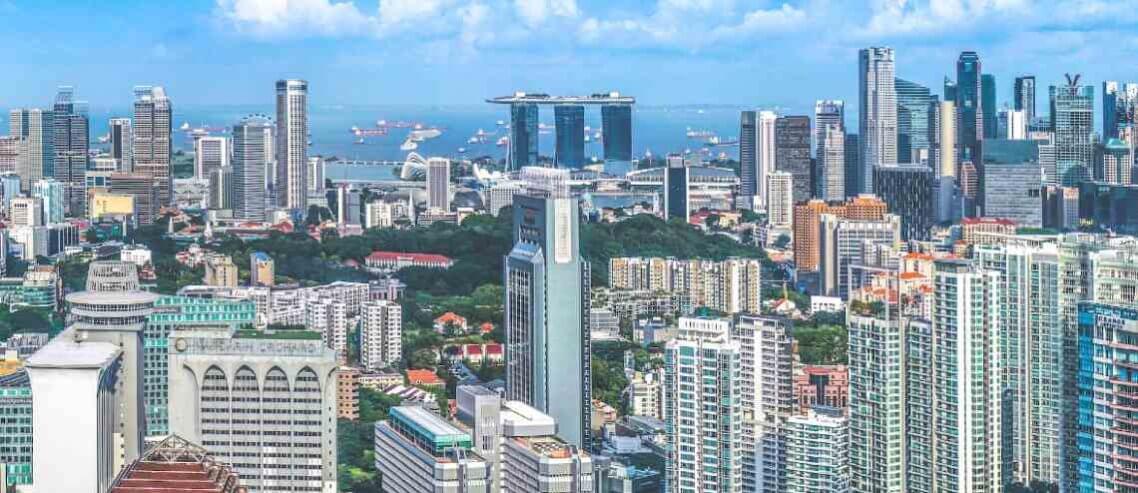How Does Singapore’s Healthcare System Work?
Singapore operates a dual healthcare system, with heavily subsidized public services for citizens and permanent residents and premium private services offering shorter wait times and better amenities. Both sectors are known for their high quality, but government subsidies apply only to locals.
For this reason, many expats opt for comprehensive health insurance to access private care and cover the potentially high medical costs.
In this article, we take a closer look at the country’s healthcare system—public and private—its costs, well-known hospitals, and how private health insurance supports expats in managing medical expenses.
An Overview of Singapore’s Healthcare System
Singapore’s healthcare system is a mix of public-private services overseen by the Ministry of Health. It combines the government-subsidized public healthcare with a strong private sector presence, and the choice between the two often depends on individual needs and budget.
Healthcare Quality and Outcomes
Singapore’s healthcare system is internationally recognized for its high quality and cost-efficiency. According to statistics, Singaporeans enjoy one of the world’s longest life expectancies, with an average of around 83–85 years.
In 2023, the Legatum Prosperity Index ranked Singapore first in healthcare, a measure of accessibility to care and the overall health of its citizens. Likewise, Bloomberg has also named Singapore the world’s most efficient healthcare system.
Singapore’s Public Health Insurance System
Singapore provides universal health coverage for its citizens and permanent residents through a unique approach involving compulsory savings, national health insurance, government subsidies, and cost-sharing mechanisms, known as the Medisave, MediShield, and Medifund.
- Medisave: This is a mandatory savings plan that consumes between 8-10.5 % (depending on age group) of an employee’s monthly salary and is used to pay for routine medical expenses and those of their immediate family members.
- Medishield: This is a national health insurance scheme that all permanent residents and citizens can use to pay for large medical bills, as well as costly surgery and outpatient treatments after Medisave funds are depleted.
- Medifund: This acts as a government safety net for eligible Singaporeans who need financial assistance to access medical care, even after tapping other funds.
Essentially, MediShield and MediSave are at the heart of Singapore’s health insurance system. Citizens and permanent residents use their MediSave accounts to pay for everyday medical bills. When costs go beyond the deductible, MediShield steps in to cover bigger, more serious expenses.
Singapore’s Private Healthcare System
Private healthcare facilities in Singapore operate as independent companies and provide a wide range of services, including emergency care, specialist consultations, surgeries, and outpatient treatments.
Compared to public hospitals, private hospitals generally offer shorter waiting times, greater privacy, and enhanced amenities—making them a popular choice among higher-income locals and expats.
While Singaporean citizens and permanent residents can partially offset private healthcare costs using government savings schemes such as MediSave and subsidies, expats must cover the full cost themselves unless they are protected by private or international health insurance.
The Cost of Healthcare in Singapore
Healthcare costs in Singapore vary significantly between the public and private sectors, with public hospitals offering significant government subsidies for citizens and permanent residents (PRs), while private hospitals are considerably pricier.
However, to ensure that the price remains reasonable, the Ministry of Health regularly publishes treatment fee benchmarks for both public and private facilities, giving patients a clear estimate of expected costs for care.
Here are some of the estimated costs of common medical services in Singapore:
Costs of Doctor Consultations in Singapore
The cost of doctor consultations in Singapore varies widely depending on the types of facilities you visit. Private hospitals are generally more expensive than public hospitals but offer shorter wait times and more convenience.
| Consultation Type | Public Hospital | Private Clinic |
| General Practitioner | SGD 36 – SGD 84
(USD $28 – USD $65) |
SGD 50 – SGD 200
(USD $39 – USD $154) |
| Specialist Consultation | SGD 90 – SGD 225
(USD $69 – USD $173) |
SGD 150 – SGD 400
(USD $116 – USD $308) |
Costs of Diagnostic Tests in Singapore
Similarly, diagnostic test costs in Singapore are highly variable depending on your chosen type of facility and the complexity of the tests.
| Diagnostic Test | Public Hospital | Private Clinic |
| Blood Test | SGD 20 – SGD 80 (USD $15 – USD $62) | SGD 50 – SGD 200 (USD $39 – USD $154) |
| MRI Scan | SGD 500 – SGD 1,500 (USD $385 – USD $1,155) | SGD 1,500 – SGD 3,000 (USD $1,155 – USD $2,310) |
| X-ray | SGD 50 – SGD 150 (USD $39 – USD $116) | SGD 100 – SGD 300 (USD $77 – USD $231) |
| CT Scan | SGD 400 – SGD 1,200 (USD $308 – USD $924) | SGD 1,200 – SGD 2,500 (USD $924 – USD $1,925) |
Surgical Procedures Costs in Singapore
When it comes to surgery in Singapore, costs can vary significantly based on the setting and type of procedure. Routine operations cost a few thousand dollars, while complex surgeries such as knee replacements often exceed SGD 35,000.
| Procedure | Public Hospital | Private Hospital |
| Appendectomy | SGD 3,000 – SGD 6,000
(USD $2,310 – USD $4,620) |
SGD 8,000 – SGD 15,000
(USD $6,160 – USD $11,550) |
| Knee Replacement | SGD 10,000 – SGD 20,000 (USD $7,700 – USD $15,400) | SGD 25,000 – SGD 40,000 (USD $19,250 – USD $30,800) |
| Cataract Surgery | SGD 4,000 – SGD 8,000
(USD $3,080 – USD $6,160) |
SGD 10,000 – SGD 18,000 (USD $7,700 – USD $13,860) |
What’s more, these benchmarks provide private health insurers with a reference point for determining what fees are considered Reasonable and Customary (R&C). If a healthcare facility charges significantly above the R&C level, patients may be responsible for paying the difference out of pocket.
The benchmarks also give private health insurance companies a reference point when deciding what fees are considered Reasonable and Customary (R&C). Hence, if a healthcare facility charges well above the R&C fees, you may have to pay for the difference out of your own pocket.
Hospitals in Singapore
Hospitals in Singapore—both public and private—offer a high-quality patient experience. This is because public hospitals in Singapore are more autonomous than government-run institutions in other countries, which in turn creates competition in the public market.
This also influences private hospitals and clinics to deliver exceptional healthcare, as they need to compete with already high-quality and cheaper public hospitals. The following section dives into details about public and private hospitals in Singapore.
Public Hospitals in Singapore
Public hospitals in Singapore are run similarly to private centers in other countries, thanks to reforms in the 1980s that gave public hospital management a greater degree of independence from governmental control.
As of 2025, Singapore has eleven public hospitals: seven general hospitals, one women’s and children’s hospital, two community hospitals, and one psychiatric hospital. Together, they provide services, including inpatient, outpatient, emergency treatment, specialist visits, and surgical procedures.
Unlike public hospitals in other countries, public patients in Singapore typically have access to comfortable environments, appointments with regular doctors, relatively shorter wait times, and options to choose from nine-, six-, five-, and four-bed wards or opt for a private room.
List of public hospitals in Singapore
- Alexandra Hospital
- Changi General Hospital
- Khoo Teck Puat Hospital
- Yishun Community Hospital
- KK Women’s and Children’s Hospital
- National University Hospital
- Ng Teng Fong General Hospital
- Jurong Community Hospital
- Singapore General Hospital
- Tan Tock Seng Hospital
- Institute of Mental Health
Private Hospitals in Singapore
Singapore is home to 9 private hospitals and numerous private clinics, most of which are operated by three major hospital groups: Parkway Holdings, Pacific Healthcare Holdings, and Raffles Medical Group.
Private hospitals are generally smaller than their public counterparts, offering more private rooms and a higher level of comfort. Care is often described as not only adequate but also luxurious—for those willing to pay a premium.
For example, at Gleneagles Singapore, single room rates start at SGD 850 (USD $660), and their most luxurious, 5-star-like suite can cost SGD 8,565 (USD $6,645) per day.
List of private hospitals in Singapore
- Crawfurd Hospital
- Farrer Park Hospital
- Gleneagles Hospital
- Mount Alvernia Hospital
- Mount Elizabeth Hospital
- Mount Elizabeth Novena Hospital
- Parkway East Hospital
- Raffles Hospital
- Thomson Medical Centre
Many expats opt for private hospitals because, for non-permanent residents, the costs are often comparable to public hospitals. Private facilities also offer shorter wait times for popular procedures and more personalized customer service.
Private Health Insurance in Singapore
Majority of expats are taking out private health insurance to offset medical costs in case they ever require more serious and expensive care.
Below you can find typical types of insurance coverage from an individual health insurance policy in Singapore:
- Inpatient coverage: Generally, inpatient coverage is included as the basic benefit for almost all insurance plans and typically covers room and board, doctor and nurse service, surgical expenses, diagnostic tests, ICU, and more.
- Outpatient coverage: This benefit provides coverage for medical treatment or doctor visits that do not require an overnight stay or hospitalization.
- Maternity coverage: This type of insurance is available as an add-on benefit and is suitable for those planning to start a family, as an average 10-24 month waiting period will apply. The benefit covers prenatal and delivery costs, and in some cases, postnatal emergency care.
- Pre-existing conditions coverage: A pre-existing condition is generally defined as a health issue that is present prior to enrolling in a new health plan. Typically, insurers do not cover those conditions, but some companies do with a potentially additional premium.
- Family insurance plan: Treated as a small group health plan, family insurance can cover all of your loved ones while ensuring lower premiums.
- Dental insurance and vision coverage: These are common add-ons for those looking to cover their dental and optical expenses.
International Health Insurance in Singapore
Many expats in Singapore opt for international health insurance to cover high medical expenses while living in the country and beyond. These plans are designed for globally mobile individuals and typically offer:
- Access to private care: Expats often rely on private hospitals in Singapore, where costs are higher but waiting times are shorter. International health insurance helps cover these expenses, ensuring peace of mind.
- Worldwide coverage: Unlike local policies, international plans cover you not only in Singapore but also when traveling or relocating elsewhere—a vital feature for expats with global lifestyles.
- Customizable Benefits: Many plans let you add maternity care, dental, or outpatient benefits, tailoring coverage to your needs.
- Portability: If you move to another country, your international health plan moves with you, eliminating the hassle of reapplying for local coverage.
Secure Your Coverage in Singapore with Pacific Prime
Despite its importance, navigating healthcare as an expat can often feel confusing and overwhelming when you want to focus on enjoying your new life in Singapore.
That’s where Pacific Prime comes in. With 25+ years of experience as a trusted insurance broker, we combine our local insights with global insurance expertise to help you find the right insurance plan for your needs and budget.
Our team simplifies the process, explores available plans, provides impartial advice, and answers any questions you may have about Singapore’s healthcare system.
Contact us today for a free quote comparison and our expert, unbiased advice.
- A Step-by-Step Guide: Renewing Health Insurance for Expats in Singapore - August 21, 2025
- Why Should Children Have Health Insurance in Singapore - August 5, 2025
- 5 Things You Didn’t Know About Wasted Drugs in Singapore - October 10, 2023







Comments
1 Comment
[…] treatment you need if an emergency occurs, without huge bills to deal with afterward. Fortunately, Singapore’s healthcare system is one of the best in the world, though it’s also one of the most expensive for non-citizens. […]
Comments for this post are closed.
We'll notify you
when our team replies!